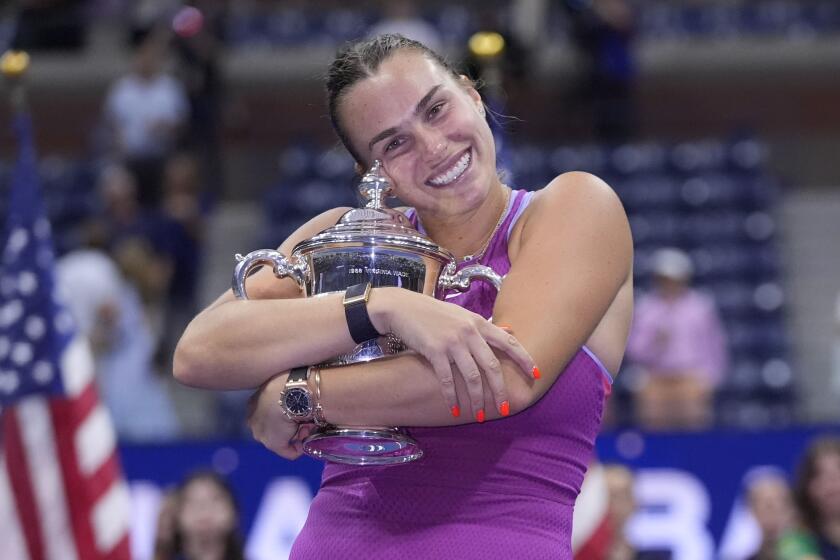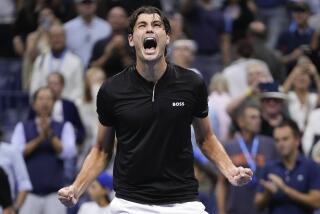Jannik Sinner beats Taylor Fritz for U.S. Open title weeks after doping exoneration

NEW YORK — Jannik Sinner started slowly at the U.S. Open, dropping the first set he played after being exonerated in a doping case no one knew about until shortly before play began at Flushing Meadows.
If that episode initially hung over him during the tournament, Sinner was able to put it aside while on court. Was he ever. The No. 1-ranked Sinner beat Taylor Fritz 6-3, 6-4, 7-5 with his typical relentless baseline game to win the men’s championship at Arthur Ashe Stadium on Sunday, less than three weeks after word emerged of his two positive drug tests.
“This title, for me, means so much,” said Sinner, a 23-year-old from Italy, “because the last period of my career was really not easy.”
He won the second Grand Slam trophy of his nascent career — the other was at the Australian Open in January — and prevented No. 12 Fritz from ending a major title drought for American men that has lasted 21 years.
Andy Roddick’s triumph at Flushing Meadows in 2003 was the last Slam title for a man from the United States. The last before Fritz, a 26-year-old from California, to even contest a final at one of the four biggest tournaments in tennis also was Roddick, who lost to Roger Federer at Wimbledon in 2009.
“Being an American at the U.S. Open is just incredible. Feeling the love all week. So thank you so much,” Fritz said during the trophy ceremony. “I know we’ve been waiting for a champion for a long time, so I’m sorry I couldn’t get it done this time. But I’m going to keep working and, hopefully, I’ll get it at the next one.”

Still, this tournament was a success in many ways for U.S. tennis, with two women and two men from the country all reaching the semifinals for the first time at a major since the 2003 U.S. Open. Jessica Pegula reached the women’s final before losing Saturday to Aryna Sabalenka of Belarus.
Sinner improved to 55-5 with a tour-high six titles in 2024. That includes a 35-2 mark on hard courts, the surface used at both the Australian Open and U.S. Open. He’s the first man since Guillermo Vilas in 1977 to win his first two Grand Slam trophies in the same season.
“So many big wins for me this season,” said Sinner, who took full advantage of Week 1 exits by Novak Djokovic and Carlos Alcaraz. “But the work never stops.”
The world found out on Aug. 20 that Sinner had tested positive twice in an eight-day span for trace amounts of an anabolic steroid in March but was cleared because his use was ruled unintentional — the banned substance entered his system via a massage from a team member he later fired.
While some players wondered whether he was accorded special treatment, most believed he wasn’t trying to dope. And the U.S. Open’s fans never gave him a hard time.
“We just went day by day … believing in ourself, which is the most important,” said Sinner, who mentioned that an aunt of his is in poor health. “I understand, especially in this tournament, how important the mental part is.”
As expected, Fritz enjoyed something of a home-court advantage on a cool afternoon under a nearly cloudless sky. In a celebrity-filled crowd that included Taylor Swift and her boyfriend, Kansas City Chiefs tight end Travis Kelce, some spectators occasionally engaged in chants of “U-S-A!” between games or rose whenever Fritz picked up what felt like a crucial point.
Aryna Sabalenka defeated Jessica Pegula 7-5, 7-5, in a rollicking U.S. Open women’s final to win the third Grand Slam title of her career.
Fritz is not the sort to show much emotion beyond a shake of his neon-colored racket, even after he went up 3-2 after 20 minutes.
Then again, that was pretty much the last significant highlight for Fritz until 3-3 in the third set, when he smacked an overhead winner to get to 15-30, punched the air and screamed, “Let’s go!” People all around rose, applauding and shouting. After Fritz deposited a volley winner to earn a break point a minute later, he celebrated in the same fashion, and thousands in the seats went wild. Sinner then double-faulted, putting Fritz in front 4-3.
But when he tried to serve out the set at 5-4, Fritz buckled enough to let Sinner pull even by breaking. Sinner used a drop shot to lure Fritz to the front court, then slid a passing shot that Fritz volleyed into the net. Fritz bounced his racket off the court. Sinner loped to the towel box, not even smiling.
About 10 minutes later, the victory was Sinner’s thanks to a closing four-game run. When it was over, Sinner raised his arms, threw his head back and closed his eyes.
He generally asserts himself during matches in what perhaps is best described as a rather casual way. His style is less spectacular than solid, less magical than metronomic. Either way, it was masterful, using his long limbs and squeaking, sliding sneakers to get to everything before aiming high-speed shot after shot right near lines — and usually succeeding.

Neither player seemed all that interested in venturing forward Sunday unless forced to, instead content to ply their forehands and backhands from the back of the court.
That’s decidedly Sinner’s territory.
By the end, Sinner, the second Italian to win a singles title at the U.S. Open, joining 2015 women’s champion Flavia Pennetta, had an impressive ledger: just 21 unforced errors, 13 fewer than Fritz, and 23 winners.
Going in, the matchup appeared to be one Fritz could keep competitive provided he demonstrated his absolute best, particularly when serving. If that’s so, the opening set turned out to be something less than an ideal for him.
He put 36% of his first serves in, delivered only two aces — a total exceeded in the initial game of the second set alone — and wound up with more than twice as many unforced errors (12) as winners (five).
Those sorts of stats would improve from Fritz’s side, but he did not figure out a way to consistently put Sinner in trouble. Few can these days.
“It’s really impressive,” Fritz acknowledged. “He was too good.”
Howard Fendrich is a writer with the Associated Press.
More to Read
Go beyond the scoreboard
Get the latest on L.A.'s teams in the daily Sports Report newsletter.
You may occasionally receive promotional content from the Los Angeles Times.










